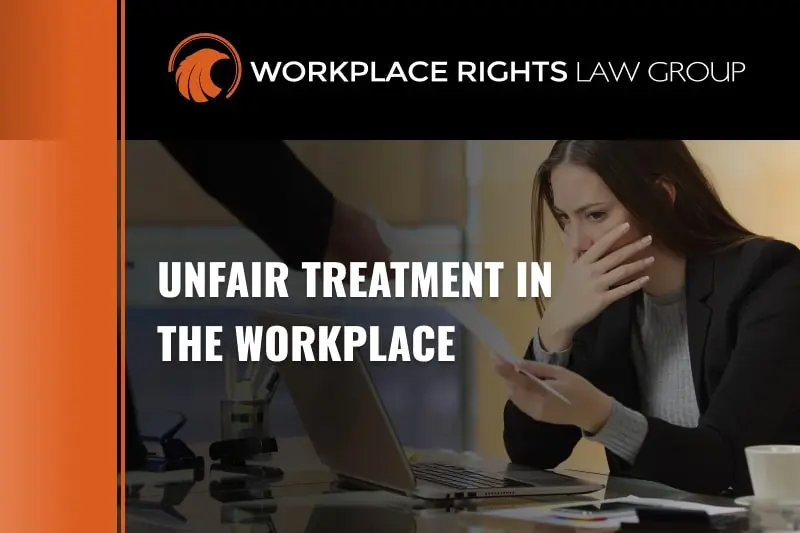
If your employer has violated your rights as an employee in California, contact attorney Theo Khachaturian today at 818-237-4166 or contact us about your case.
Unfortunately, the workplace can be unkind.
Sometimes you can bring legal action against your employer for unfair treatment at work, and sometimes you can’t.
How do you know when a workplace issue is legally actionable?
Read the following article for insights and consult with an experienced workplace discrimination attorney to evaluate your case.
Defining Workplace Discrimination and Harassment
Before you file a complaint or lawsuit for being unfairly treated at work, you should be able to answer the following questions about your case:
- What negative act did your employer commit or allow?
- What protected characteristic or protected activity of yours motivated the negative act?
- What evidence do you have to prove the negative act and the motivation for it?
You don’t have to have every detail of the answers to these questions ready before you file a complaint or lawsuit, but you should have a basic answer to each question before starting legal action.
Protected Characteristics
In general, your personal characteristics should not prevent you from getting a job, keeping a job, or reaping the benefits of your work. It’s illegal to discriminate against or harass an employee for any of the following reasons:
- Religion,
- Race,
- Age,
- Disability,
- Sex,
- Gender/gender identity,
- Marital status,
- Ancestry,
- Veteran status,
- Military status,
- Medical condition,
- Genetic information,
- Color, or
- Pregnancy.
In many cases, you have protection against discrimination motivated by the personal characteristics you have and the characteristics your employer thinks you have.
Protected Activities
California law also prevents your employer from punishing you for engaging in certain activities that are protected by law, such as:
- Serving on a jury (with proper notice);
- Taking necessary family or medical leave;
- Attending court because you are the victim of certain criminal activity;
- Seeking care because you are the victim of certain criminal activity;
- Sharing your salary or wage information with others;
- Participating in a workplace complaint;
- Taking time off to fulfill first responder duties;
- Taking advantage of lactation rights;
- Participating in politics;
- Whistleblowing; and
- Asserting your rights as an employee.
Legally actionable workplace activity normally comes in the form of discrimination or harassment.
Workplace Discrimination
You don’t have to wait to be fired before you can file a complaint or lawsuit for workplace discrimination.
You can sue or file a discrimination complaint against an employer who takes any of the following negative actions against you based on protected characteristics or activities:
- Denying a job,
- Denying a promotion,
- Denying a training or education opportunity,
- Providing unequal payment,
- Providing unequal working conditions,
- Making an unfavorable job transfer,
- Demoting you,
- Denying work-related benefits, or
- Terminating you.
Please note that you can file a discrimination lawsuit or complaint against your employer in California only if they have five or more employees.
Workplace Harassment
Workplace harassment can be harder to define, but it’s still repugnant and serious. Harassment can include constant, inappropriate comments about a protected group or activity, unwanted touch, or inappropriate requests.
Many think of sexual harassment when they think of harassment complaints, but harassment based on any protected group or activity can be legally actionable.
Also, you can bring legal action for harassment against your employer, no matter how few employees they have.
Evidence
Once you know your employer engaged in illegal discrimination or harassment, you need to be able to prove it.
Some of your proof may come during the investigation phase of a Department of Fair Employment and Housing (DFEH) complaint, or the discovery phase of a lawsuit, but you need to have some proof before you complain.
Useful evidence can be in the form of:
- Emails,
- Write ups,
- Commendations,
- Witness testimony,
- Personal notes,
- Employee handbooks, and
- Records of previous human resources complaints.
If you’re still working at your job, take note of each discriminatory or harassing event and any witnesses.
Filing a Complaint
If you want to sue your employer in civil court, the employment lawyers at Workplace Rights Law Group can apply for a right-to-sue letter on your behalf. That letter initiates the process of a lawsuit.
You have three years to file a DFEH complaint, and you could have as little as 180 days to file an EEOC complaint. These deadlines move fast, but an attorney can handle them for you.
Reach out to an Employment Attorney Who Can Win You Justice
Negative treatment at work is especially disheartening when your employer punishes you for unlawful reasons. You don’t have to take mistreatment without a fight, and you don’t have to fight alone.
At the Workplace Rights Law Group, LLP, we are passionate about righting the wrongs our clients have suffered at work.
Our employment attorneys have 75 years of combined experience in employment law, and we work hard to fulfill our clients’ unique legal needs.
We’re here to listen, and we’re here to help. Call us at 818-237-4166 or reach out to us online for a free case review.
Where You Can Find Our Glendale Office Location
Where You Can Find Our Riverside Office Location
